Should children and teens with hearing loss learn music?
Generally yes, according to the biologist Dr. Nina Kraus in her illuminating book, Of Sound Mind: How Our Brain Constructs a Meaningful Sonic World. Music study improves children and teenagers’ ability to process spoken conversations by triggering changes in their brains–even if they don’t have perfect hearing.
As founding editor of Grand Piano Passion™, I have received emails from caregivers and music teachers describing a child with hearing loss who can’t stop talking about playing the clarinet or a teenager with hearing loss who wants to join an acapella group. Caregivers and music teachers worry that by acceding to these requests, they invite frustration and failure.
“Let your child be your guide,” I counsel them. Let the child experiment with music and see what next steps unfold. Of course, there are a lot of considerations for anyone with hearing loss to learn an instrument, especially as the severity of the hearing loss increases. First among them is to ensure that the music instructor understands the child’s hearing abilities. Yet accommodations can be made to honor the child’s desire to make music.
Dr. Nina Kraus’ book offers an impressive body of research and science on how and why children and teenagers benefit from making music. A professor of neurobiology and otolaryngology, Dr. Kraus is a scientist, inventor, and amateur musician.
How does making music benefit hearing abilities?
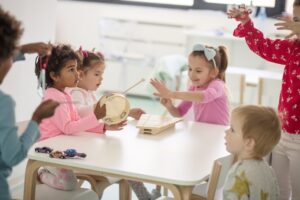 Studying music helps children and teens better process the building blocks of spoken language. “Similar sound ingredients underlie speech and music,” Dr. Kraus explains. Those ingredients include sound’s pitch, timing, and the interplay between the two. The children in her Brainvolts lab evaluated before and after music training showed improvement in their brain’s processing of speech sounds.
Studying music helps children and teens better process the building blocks of spoken language. “Similar sound ingredients underlie speech and music,” Dr. Kraus explains. Those ingredients include sound’s pitch, timing, and the interplay between the two. The children in her Brainvolts lab evaluated before and after music training showed improvement in their brain’s processing of speech sounds.
In addition, her lab discovered that making music helps grammar school children better tolerate background noise, an important skill given society’s noisy environments such as stadiums, restaurants, and shopping malls. She concludes that music makers are better able to hone their minds to “efficiently analyze auditory scenes.”
“Speaking as a biologist, I reason that with or without hearing loss, making music can strengthen how we make sense of sound.”
While Dr. Kraus did not explicitly test a subgroup of children and teenagers with hearing loss, she encourages them to make music. “Music is holistic. It engages all our senses, our memory, our emotions including our gut feelings, and how we move. The underlying biological principles behind making music apply to all of us,” she stressed in an email to Grand Piano Passion™. “Speaking as a biologist, I reason that with or without hearing loss, making music can strengthen how we make sense of sound.”
How long do the benefits take to accrue?
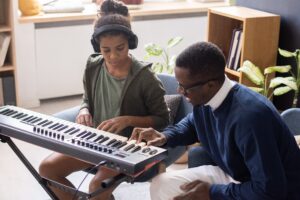 Two years. Dr. Kraus’ Brainvolts Lab demonstrated that to realize these benefits to hearing, the child or teenager requires two years of making music. “Who we are from a biological perspective takes long-standing and persistent engagement,” she explains. The good news is that this two-year period does not necessarily need to begin during elementary school. According to Dr. Kraus, high school students who engage in two years of making music realize similar benefits.
Two years. Dr. Kraus’ Brainvolts Lab demonstrated that to realize these benefits to hearing, the child or teenager requires two years of making music. “Who we are from a biological perspective takes long-standing and persistent engagement,” she explains. The good news is that this two-year period does not necessarily need to begin during elementary school. According to Dr. Kraus, high school students who engage in two years of making music realize similar benefits.
Does the type of instrument matter?

Thankfully, no. Dr. Kraus reports that children and teenagers realize the benefits of making music regardless of the instrument and genre played. Voice instruction works just as well.
Are there any other requirements?
Refreshingly, no. Instruction may be in a group or individual, in school or at private lessons. Perhaps most encouragingly, the instructor does not need extensive training, with both public-school teachers and musicians without formal teaching credentials creating the brain shifts in their students.
How long do the benefits last?
To some extent into adulthood and even old age. Dr. Kraus notes that “once your brain has learned to make strong connections between sound and meaning, the brain continues to reinforce this skill automatically.”
Will listening to music create the same effect?
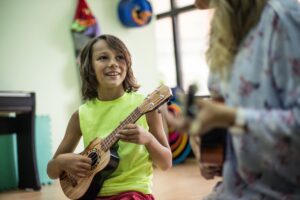 If only life were that easy! The child or teenager needs to be actively engaged with making music to realize the benefits. Dr. Kraus’ Harmony Project did not register any changes to the brain when instructors taught children and teenagers how to actively listen to music. “There must be training, repetition, and practice for long-last brain changes in sound processing to take place,” she concludes.
If only life were that easy! The child or teenager needs to be actively engaged with making music to realize the benefits. Dr. Kraus’ Harmony Project did not register any changes to the brain when instructors taught children and teenagers how to actively listen to music. “There must be training, repetition, and practice for long-last brain changes in sound processing to take place,” she concludes.
Is there anything else I should know?
 Yes. Contrary to popular belief, almost every child and teenager has musical potential. While only 2.5 percent of the population is musically gifted, only an additional 2.5 percent are truly unmusical. That leaves 95% of the population that is sufficiently musical to “to reach a professional level [emphasis added] if they invest enough practice hours,” according to Isabelle Peretz, a psychology professor with a focus on neurocognition of music, quoted in Of Sound Mind.
Yes. Contrary to popular belief, almost every child and teenager has musical potential. While only 2.5 percent of the population is musically gifted, only an additional 2.5 percent are truly unmusical. That leaves 95% of the population that is sufficiently musical to “to reach a professional level [emphasis added] if they invest enough practice hours,” according to Isabelle Peretz, a psychology professor with a focus on neurocognition of music, quoted in Of Sound Mind.
If your child with hearing loss wants to learn an instrument or sing in a choir, support them. The conclusion is clear: children with hearing loss may strongly benefit from making music. And who knows? Your child might just end up as a concert pianist like I did.

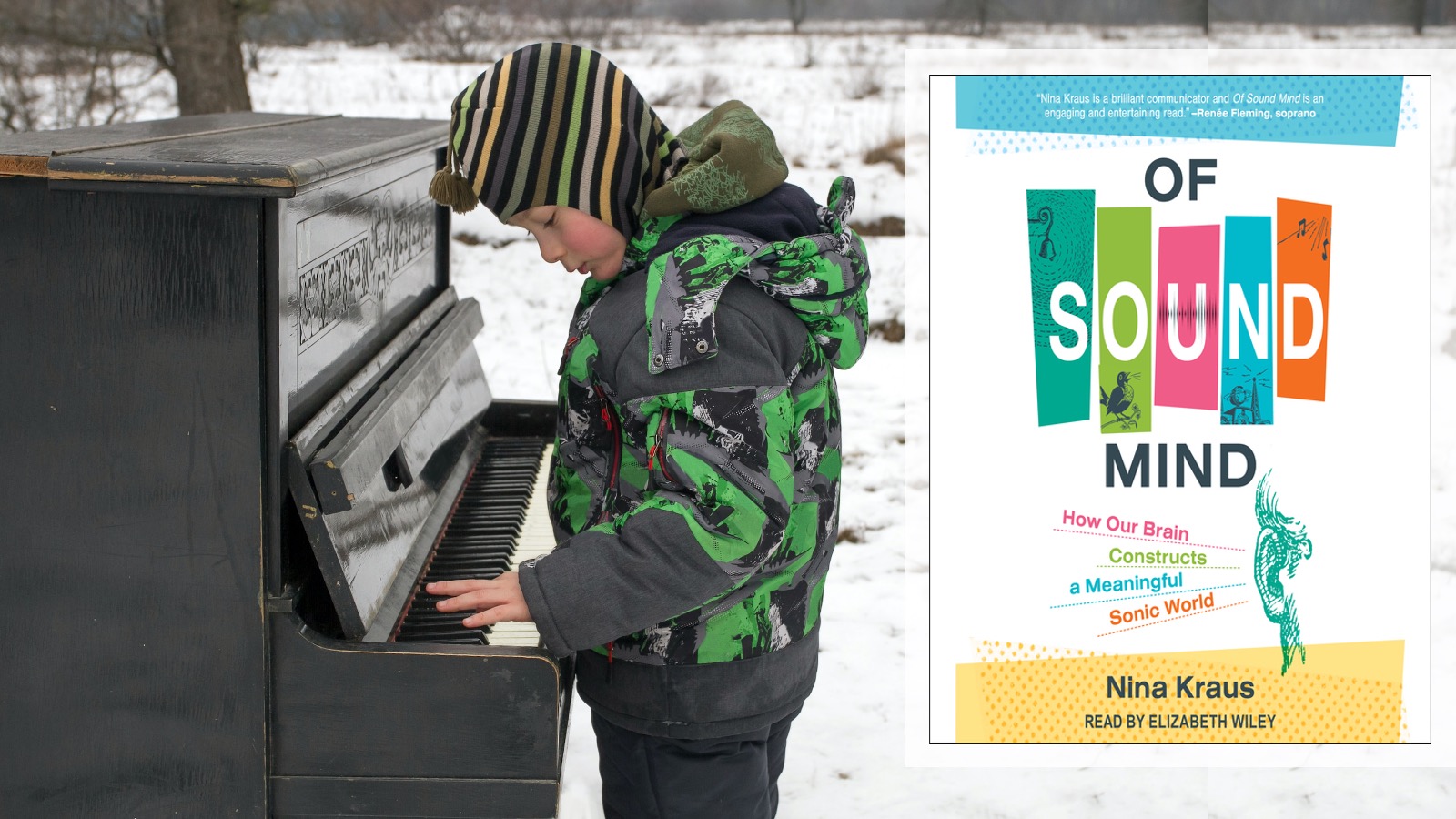

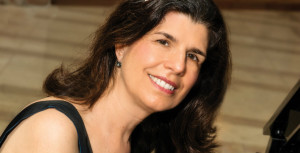
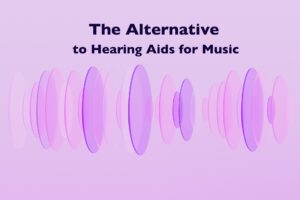
0 Comments